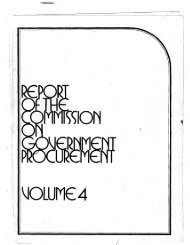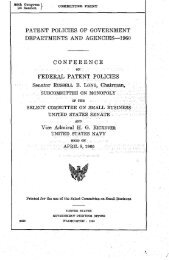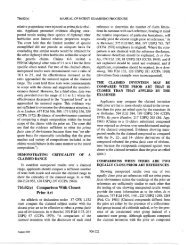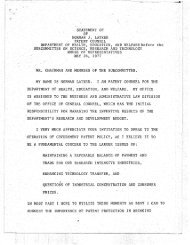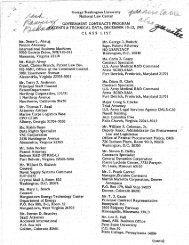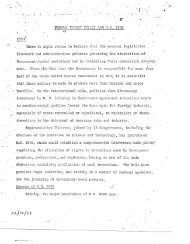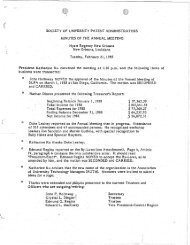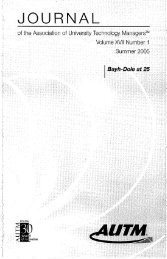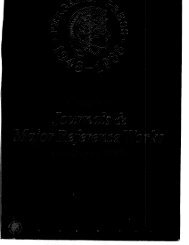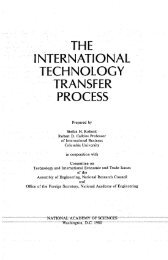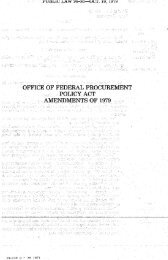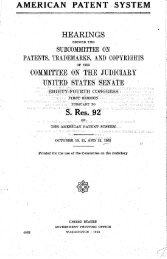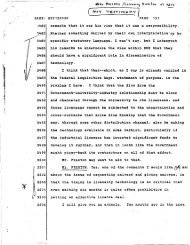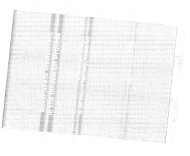The Subject Patent Already Has Underlining or ... - Bayhdolecentral
The Subject Patent Already Has Underlining or ... - Bayhdolecentral
The Subject Patent Already Has Underlining or ... - Bayhdolecentral
You also want an ePaper? Increase the reach of your titles
YUMPU automatically turns print PDFs into web optimized ePapers that Google loves.
1840 MANUAL OF PATENT EXAM1NlNG PROCEDURE<br />
(3) Conducting international and international-type<br />
searches and preparing international and international-type search<br />
rep<strong>or</strong>ts (PCT Art. 15, 17 and 18, and peT Rnles 25, 33 to 45 and<br />
47); and<br />
(4) Transmitting the international search rep<strong>or</strong>t tc the<br />
applicant and the International Bureau.<br />
<strong>The</strong> United States <strong>Patent</strong> and Trademark Office<br />
agreed to and was appointed by the PCTAssembly, to<br />
act as an International Searching Anth<strong>or</strong>ity. As such<br />
an auth<strong>or</strong>ity, a primary function is to establish documentary<br />
search rep<strong>or</strong>ts on pri<strong>or</strong> art with respect to<br />
inventions which are the subject ofapplications. See<br />
PCT Article 16.<br />
Pursuant to an agreement concluded with the International<br />
Bureau, the USPTO, as an International<br />
Searching Auth<strong>or</strong>ity, agreed to conduct international<br />
searches and prepare intemational search.rep<strong>or</strong>ts, f<strong>or</strong>,<br />
in addition to the United States of America, Barbados,<br />
Brazil, India, Israel, Mexico, New Zealand, South<br />
Africa, and Trinidad and Tobago. <strong>The</strong>agreementstipulated<br />
the English language and specified that the<br />
subject matter to be searched is that which is searched<br />
<strong>or</strong> examined in United States national applications.<br />
TRANSMITTAL OF THE SEARCH COpy TO<br />
THE INTERNATIONAL SEARCHING AU·<br />
THORITY<br />
<strong>The</strong> "search copy" is transmitted by the Receiving<br />
Office to the International Searching Auth<strong>or</strong>ity (PCT<br />
Article 12(1», the details of the transmittal are provided<br />
in PCT Rule 23.<br />
THE MAIN PROCEDURAL STEPS IN THE IN·<br />
TERNATIONAL SEARCHING AUTHORITY<br />
<strong>The</strong> main procedural steps that any international<br />
application goes through in the International Searching<br />
Auth<strong>or</strong>ity are (I) the making of the international<br />
search (PCT Article 15), and (2) the preparing of the<br />
international search rep<strong>or</strong>t (PCT Article 18 and PCT<br />
Rule 43).<br />
COMPETENT INTERNATIONAL SEARCHING<br />
AUTHORITY<br />
In respect of international applications filed with<br />
the U.S. Receiving Office, the United States International<br />
Searching Auth<strong>or</strong>ity, which is the Examining<br />
C<strong>or</strong>ps of the United States <strong>Patent</strong> and Trademark<br />
Office, and the European <strong>Patent</strong> Office are competent<br />
August 2001<br />
1800-44<br />
to carry out the international search (pCT Article 16,<br />
PCT Rules 35 and 36, 35 U.S.C. 362 and 37 CFR<br />
1.413).<br />
<strong>The</strong> United States <strong>Patent</strong> and Trademark Office has<br />
inf<strong>or</strong>med the International Bureau that in addition to<br />
the United States <strong>Patent</strong> and Trademark Office, the<br />
European <strong>Patent</strong> Office is competent as an International<br />
Searching Auth<strong>or</strong>ity f<strong>or</strong> searching all kinds of<br />
international applications filed in the United States<br />
Receiving Office on and after October I, 1982. (pCT<br />
Article 16(2) and PCT Rule 35.2(a)(i).<br />
MATTERS TO BE CONSIDERED WHEN<br />
CHOOSING AN INTERNATIONAL SEARCH<br />
ING AUTHORITY<br />
Choosing <strong>The</strong> European <strong>Patent</strong> Office (EPO) as an<br />
International Searching Auth<strong>or</strong>ity could be advantageous<br />
to United States applicants who designate countries<br />
f<strong>or</strong> European Regional patent protection in PCT<br />
International applications f<strong>or</strong> the following reasons:<br />
(A) Claims may be amended acc<strong>or</strong>ding to EPO<br />
search results bef<strong>or</strong>e entering the European Office as<br />
a designated Office.<br />
(B) <strong>The</strong> EPO search fee need not be paid upon<br />
entering the European Office as a designated Office.<br />
(C) <strong>The</strong> EPO search results may be available f<strong>or</strong><br />
use in a U.S. pri<strong>or</strong>ity application.<br />
(D) <strong>The</strong> EPO international search may be<br />
obtained without the need f<strong>or</strong> a European professional<br />
representative.<br />
(E) <strong>The</strong> European <strong>Patent</strong> Office search could provide<br />
the U.S. applicant with the benefit of aEuropean<br />
art search (which may be different from applicant's<br />
own <strong>or</strong> the USPTO's search) bef<strong>or</strong>e it is necessary to<br />
enter the European <strong>Patent</strong> Office <strong>or</strong> other designated<br />
Offices.<br />
Some of the disadvantages that may occur due to<br />
the European <strong>Patent</strong> Office making the international<br />
search are the following:<br />
(A) Additional mailing time to and from the EPO<br />
Searching Auth<strong>or</strong>ity may sh<strong>or</strong>ten the time f<strong>or</strong> applicants<br />
to respond to various invitations from the EPO<br />
such as f<strong>or</strong> comments on abstracts and payments of<br />
additional search fees as well as f<strong>or</strong> PCT Article 19<br />
amendments to the claims after issuance of the International<br />
Search Rep<strong>or</strong>t.



